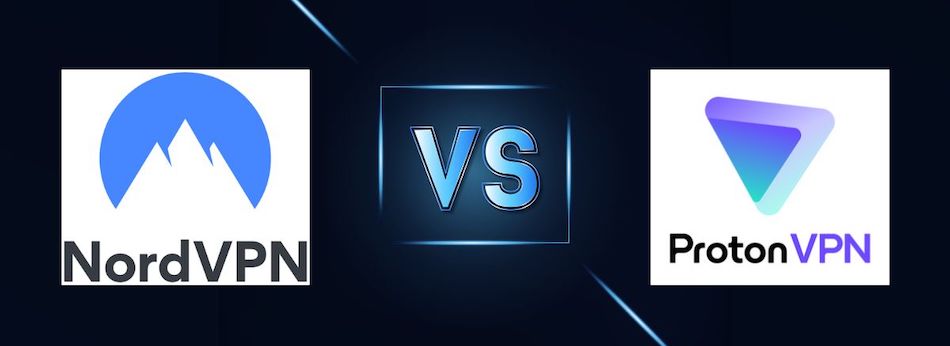
NordVPN and Proton VPN are both popular VPN services, but the latest test results for 2024 show there is one very clear winner, especially in terms of speeds, security features, and overall value.
NordVPN and Proton VPN are well-respected names in the VPN industry and privacy community at large. While NordVPN has been around longer and is one of the most popular VPNs in the industry, Proton VPN is also making a name for itself and growing. So who comes out on top in this Proton VPN vs NordVPN comparison?
We’ll let the test results show you the answer to that question a bit further below. But first, let’s cover the basics of each VPN service:
| NordVPN | Proton VPN | |
| Website | NordVPN.com | ProtonVPN.com |
| Location | Panama | Switzerland |
| Servers | 6,400+ | 6,225+ |
| Countries | 111 | 100 |
| Logs | No logs (audited) | No logs (audited) |
| Torrenting | All servers | Restricted ⛔️ |
| Support | 24/7 chat; Email; Knowledge Base | Chat; Email; Knowledge Base |
| Apps for | Windows, macOS, Linux, Android, iOS | Windows, macOS, Linux, Android, iOS |
| Price | $3.39 (with coupon) | $3.59 |
| Coupon | 72% Off Coupon > | 64% Off Coupon > |
NordVPN continues to be a leading VPN globally, with an extensive server infrastructure, superior speed, and security, with a range of privacy options that most VPNs can’t match. They consistently outdo other VPNs in terms of functionality, features, and streaming performance.
Proton VPN is also focused on privacy and security but has a smaller set of features, a higher price, and less access to popular streaming sites. Additionally, there have been a few different logging cases involving Proton Mail, the sister company of Proton VPN, logging user IP addresses for government authorities. While Proton VPN is an audited no-log VPN, the fact that their sister company was involved in these different cases may give you pause.
So which one comes out on top in this NordVPN vs Proton VPN comparison? While we like and recommend both of these services, there was a clear winner in almost every category. Here are the areas we’ll examine:
- Company background and jurisdiction
- Features
- Speed tests
- Streaming and torrenting
- Security and Encryption
- Privacy
- Prices and Refunds
- Value
We’ll take a deep dive into each of these categories, while also posting the test results below. By naming a winner in each category, we hope to give you a fast way to identify the VPN that is most worth your attention.
Background and jurisdiction: Proton VPN vs NordVPN
Learning something about the background of a company that you are going to trust with your privacy makes sense. While a VPN can prevent others from spying on your online activities, you need to be able to trust the VPN not to spy on you.
Unfortunately, some VPNs have done exactly that, sharing what users thought was private information with various third parties (often law enforcement). For example, PureVPN shared information about a user with the FBI, despite claiming to be a no-logs VPN. To see how PureVPN compares to NordVPN in other ways, check out this NordVPN vs PureVPN article.
Given that, let’s see what we can learn about the companies behind these two VPNs.
NordVPN background and jurisdiction
| Website | NordVPN.com |
| Based in | Panama |
| Logs | No logs (audited) |
| Price | $3.39/mo. |
| Support | 24/7 live chat |
| Refund | 30 days |
| Deal | 72% Off Coupon |
NordVPN is one of the best-known companies in the VPN industry. It is part of NordSec, a brand that includes NordVPN, and other security products including the secure password manager NordPass, and the encryption/cloud storage tool NordLocker. This company has an excellent background and track record and has also passed multiple third-party audits.
NordVPN is strategically based in Panama, a strong privacy jurisdiction that is not part of any surveillance alliances. The country does not have any mandatory data retention or logging laws. These characteristics make Panama an excellent jurisdiction for privacy-focused services like NordVPN. You can see some of the disadvantages of a VPN based in a bad privacy jurisdiction in our NordVPN vs TorGuard comparison.
Our NordVPN review has more information on the company’s background.
Proton VPN background and jurisdiction
| Website | ProtonVPN.com |
| Based in | Switzerland |
| Logs | No logs (audited) |
| Price | $3.59/mo. |
| Support | Email + Chat |
| Refund | 30 days |
| Deal | 64% Off Coupon |
Proton VPN comes to us from the team behind Proton Mail. The parent company of Proton VPN (and ProtonMail) is Proton Technologies, a well-respected company based in Switzerland. Like Panama, Switzerland is a good privacy jurisdiction and is not a party to any international surveillance alliances.
Even before Proton VPN was officially launched in 2017, Proton Mail had built up a strong following in the privacy community. It is one of the leading secure email services. Today, you can combine both Proton Mail and Proton VPN under one subscription.
In the Proton VPN review, we noted how Proton has a history of targeted logging against specific users, based on Swiss court orders. Here are two examples of this that we have covered on RestorePrivacy:
- Proton Mail Discloses User Data Leading to Arrest in Spain
- ProtonMail Gives Up Logs on User, Then Scrubs Website of No IP Logging Claims
Both NordVPN and Proton VPN are backed by reputable companies based in privacy-friendly jurisdictions. But we do consider Panama to be a slightly better jurisdiction for privacy than Switzerland. Additionally, Switzerland has been able to pressure Proton Technologies into logging users for law enforcement, while to our knowledge Panama has never tried to pressure any NordSec company to log anything.
NordVPN vs Proton VPN Features
Now we will examine how Proton VPN and NordVPN compare with each other in the features category.
| Feature | NordVPN | Proton VPN |
|---|---|---|
| Split tunneling | Yes | Yes |
| RAM-only servers | Yes | No |
| Kill Switch | Yes | Yes |
| Private DNS | Yes | Yes |
| Logs | No logs (audited) | No logs (audited) |
| Multiple VPN protocols | Yes | Yes |
| Browser Extensions | Yes | Yes |
| Built-in ad blocking | Yes | Yes |
| Double VPN servers | Yes | Yes |
| Obfuscated (stealth) servers | Yes | Yes (Secure Core servers) |
| Onion over VPN servers | Yes | No |
| P2P servers | Yes | No |
| Dedicated IP servers | Yes | Yes |
| Free version | No | Yes |
Proton VPN features
Proton VPN’s network currently consists of 6,225+ servers in 100 countries. This is a good-sized network and should be sufficient for your needs.
Unfortunately, you need to be subscribed to the paid Proton VPN plans to use most of those servers. Proton Free subscribers are limited to a small number of free (slower) servers located in three countries. There are also other limitations of the Proton Free plan, such as no streaming, torrenting, or access to Secure Core server access.
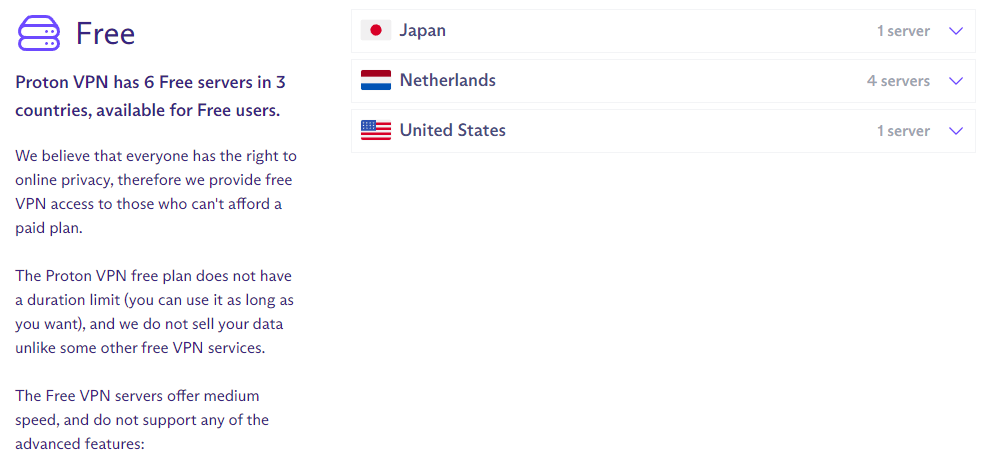
The company claims that its network provides high-speed connections for premium users. But in our tests with a paid account, we simply could not find a server that was anywhere near the speeds that NordVPN delivers.
The Proton VPN apps are sharp-looking, and have useful privacy and security features such as a kill switch, auto-reconnection to the network, DNS leak protection, and split tunneling (on some of their apps). All Proton VPN apps are open source. They provide apps for Windows, Mac, Linux, iOS, Android, and various VPN routers.
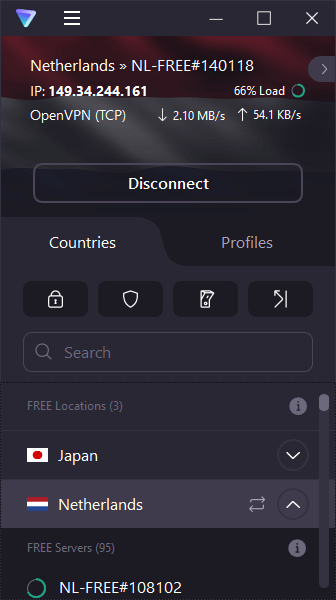
Here you can see some of the privacy features of the Proton VPN Windows VPN app that we tested:
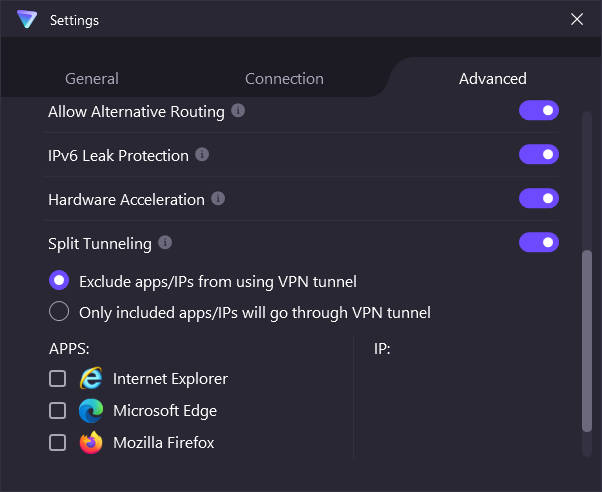
Double VPN servers are actually two VPN servers connected sequentially. By sending your internet traffic through two servers in this way, it becomes extremely difficult for a hostile entity to associate specific internet traffic with particular users. This is true even if the hostile entity manages to get control of one of the two servers in this configuration.
The Proton VPN Secure Core feature is a type of double VPN feature. Proton Technologies says what makes Secure Core different from other double VPN features is the effort they put into protecting these servers.
They are installed in high-security data centers to ensure strong physical security. Secure Core servers are wholly owned and provisioned by Proton VPN (what NordVPN and other companies call colocated servers). In addition, Secure Core servers are connected to the Internet using Proton VPN’s own dedicated network using IP addresses that are owned and operated by Proton VPN’s own Local Internet Registry (LIR).
These are all good characteristics for the Secure Core feature to possess. That said, it is unclear to me whether Secure Core provides any significant advantages over the double VPN configurations of services like NordVPN and Surfshark, which also select secure data centers and are in the process of moving to 100% colocated servers (rather than just the subset of all servers that Secure Core includes).
Stealth protocol. This is Proton VPN’s “undetectable” obfuscation feature that disguises VPN traffic to hide it from internet censors and also gets around VPN blocks. The company claims that Stealth is superior to other obfuscated protocols because it was designed from the ground up instead of being a hack on top of an existing protocol. This may be useful if you need a VPN for UAE, where VPNs are often blocked.
VPN Accelerator. This feature is built into all Proton VPN apps. It is said to deliver speeds up to 400% faster than you would get without the accelerator, especially when you are using a “less reliable” internet connection. It is hard to say whether or not VPN Accelerator is effective since Proton VPN is still a rather slow service.
NetShield Ad-blocker. This is a VPN ad-blocking DNS filter that protects your devices from ads, trackers, and malicious software by preventing your devices from connecting to domains where these kinds of things are found. It works much the same as NordVPN’s Threat Protection Lite.
NordVPN features
NordVPN has all the basic features that we covered with Proton VPN, including built-in leak protection and kill switches on all their VPN apps. But NordVPN also offers many advanced privacy features. They have apps for everything Proton VPN does and more. They also support options such as Android TV, gaming consoles, and Raspberry Pi.
NordVPN features WireGuard support in the form of a custom VPN protocol called NordLynx. A privacy-first implementation of Wireguard, NordLynx improves WireGuard privacy using a Double NAT system to ensure that user IP addresses never appear on the VPN servers. See our WireGuard VPN guide for details. By default, NordVPN is configured to automatically select the best VPN protocol for any situation. However, you can force it to use NordLynx manually if you wish in Settings:
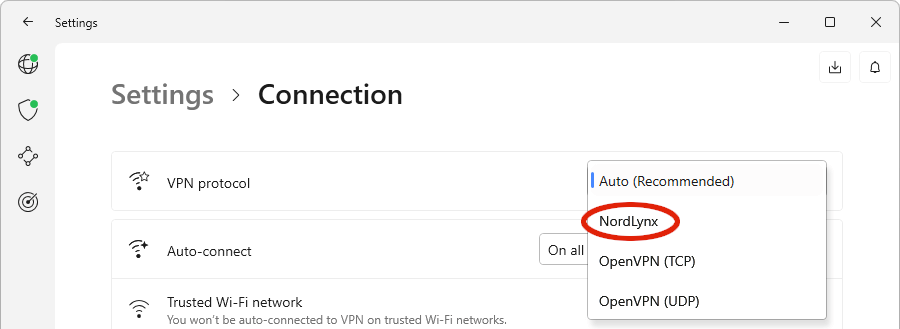
NordVPN has servers in 111 countries worldwide and their network contains over 6,400 servers. This is slightly more servers and more countries than we see with Proton VPN. And unlike Proton VPN, the entire NordVPN server network is available to all users (no restrictions).
As you’ll see shortly, the NordVPN network is much faster than the Proton VPN network, with many of Nord’s servers already upgraded to 10 Gbps data connections. While Proton VPN’s Secure Core servers are colocated (installed and managed) by Proton Technologies, NordVPN is transitioning to colocation for all 6,300+ of their servers.
Another difference between NordVPN and Proton VPN is that NordVPN offers more specialty servers for various use cases:
- P2P servers optimized for torrenting. These fast servers are ideal for torrenting large files.
- Obfuscated servers that conceal VPN traffic as regular HTTPS encryption, like Proton VPN’s Stealth protocol. A great tool if you need a VPN for China or the UAE, where VPNs are blocked. As explained here Proton VPN has been blocked in China since 2019. We have not received any information to the contrary since then.
- Double-VPN servers encrypt VPN traffic over two different locations. Similar to Proton VPN’s Secure Core servers.
- Tor-over-VPN servers add an additional layer of encryption via the Tor network.
- Dedicated IP servers for those applications where you want or need a fixed IP address plus the security of a VPN, dedicated IP servers are the ideal solution.
- Meshnet is a new feature that allows you to create a VPN connection across a private network of trusted NordVPN devices.
See all NordVPN features here >
Here’s the NordVPN Windows client. On the left side of the app, you can see the specialty servers, with an active connection to a Double VPN (United States – Canada) server configuration.
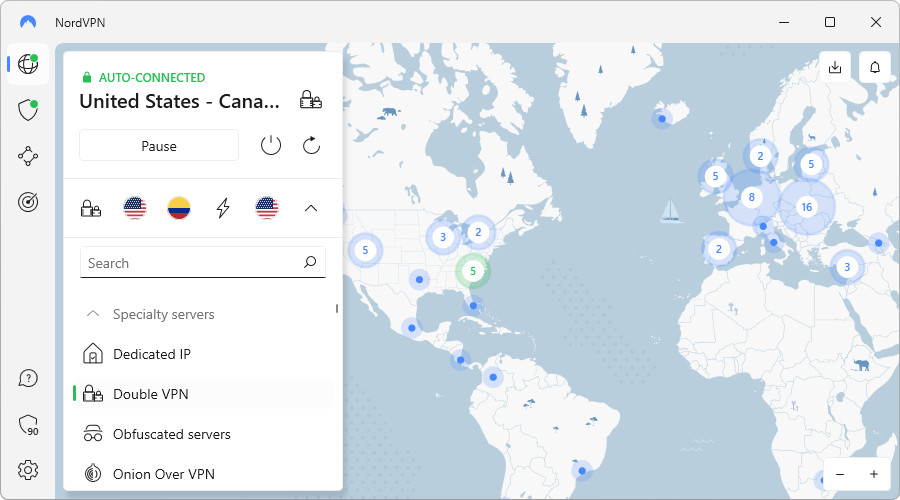
One last NordVPN feature to consider is Threat Protection. This feature is included in NordVPN’s Windows and macOS desktop apps. It blocks ads, trackers, and malware, and can even scan documents you download for malware before you can open them. This turns NordVPN into a powerful VPN ad blocker for all your devices. Threat Protection protects everything, even apps and services that are not connected to the VPN.
Threat Protection Lite provides a similar level of protection to what Proton VPN’s NetShield delivers. Threat Protection Lite is available for most NordVPN apps and browser extensions that do not support the full Threat Protection feature.
Features winner: NordVPN
NordVPN vs Proton VPN speed tests
Given all the work a VPN must do to protect your data, it is only logical that they would slow your VPN connection down somewhat. But how much any particular VPN slows you down can vary enormously.
We ran all of these NordVPN vs Proton VPN speed tests with a 500 Mbps internet connection in our US lab. We tested servers in the United States and the United Kingdom, as well as Double VPN servers from each service.
Test #1: Seattle, USA
Here is a Proton VPN server in Seattle, which gave me about 122 Mbps. This is faster than the 92 Mbps I recorded previously using OpenVPN. But it is still pretty darn slow.

Now let’s see if NordVPN is faster than Proton VPN with this location.
Here was the NordVPN server in Seattle at 445 Mbps.

This is one of the fastest VPN speed test results we’ve gotten here on Restore Privacy. For the Seattle server location, NordVPN was 323 Mbps faster than Proton VPN (almost triple the speed!). This could provide a massive benefit for NordVPN users.
Test #2: New York, USA
Here was the Proton VPN server in New York at about 158 Mbps.

While this is somewhat faster than the Proton VPN server in Seattle, it is still not very fast.
Here was the NordVPN server in New York, giving us a speed of 280 Mbps.

It’s clear that NordVPN offers significantly faster speeds than NordVPN with the US servers we tested. Let’s see if overseas servers were any different.
Test #3: United Kingdom
Here was the Proton VPN server in the UK at only 17 Mbps. This is actually worse than the result we recorded last time (20 Mbps) using OpenVPN. And it is really a horrible result.

This is the slowest Proton VPN server that we tested. We would not expect speeds this slow with a premium (high-priced) VPN service.
Here was the NordVPN server in the UK at over 295 Mbps.

For the UK region, NordVPN was more than 14 times faster than Proton VPN, nearly hitting 300 Mbps. This is really impressive, especially when you consider the high latency and long distance between my location and the VPN server. NordVPN clearly delivers on speeds and is the best VPN for UK server speeds.
Double VPN speed tests with NordVPN and Proton VPN
NordVPN and Proton VPN both offer Double VPN servers. Because there are two physical servers in a Double VPN connection, they will usually be somewhat slower than a standard connection.
Note: All NordVPN users can select the Double VPN servers directly in the NordVPN app. The Proton VPN Secure Core (Double VPN) servers are only available with a paid subscription.
Here we tested a Proton VPN Secure Core server using the Switzerland > United States configuration and got a speed of 48 Mbps.
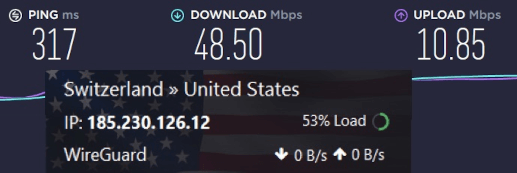
Here’s a NordVPN double-VPN server with the US > Canada configuration: 214 Mbps.

The Double VPN servers from NordVPN are significantly faster than the Secure Core (double VPN) servers from Proton VPN. This is true for other services offering double-VPN servers as well, as seen in our Surfshark vs NordVPN comparison.
| Location | NordVPN | Proton VPN |
| Seattle | 445 Mbps | 122 Mbps |
| New York | 280 Mbps | 158 Mbps |
| United Kingdom | 295 Mbps | 17 Mbps |
| Secure Core vs Double VPN | 214 Mbps | 48 Mbps |
Why is NordVPN so much faster than Proton VPN?
We can’t say for sure why Proton VPN is so much slower than NordVPN. Many factors affect VPN speed, from the processing power and loading of the individual servers to the bandwidth of the connections between them, to the physical distance the signals must travel.
One big surprise in our current round of Proton VPN testing was that we recorded slower speeds when using WireGuard than we had previously seen with OpenVPN. In our WireGuard vs OpenVPN speed tests, WireGuard outperformed OpenVPN with every server location.
Regardless of the reasons, Proton VPN struggles to deliver high-speed connections, while NordVPN keeps getting better. NordVPN is also faster than other leading VPNs, as we can see in the NordVPN vs CyberGhost comparison.
Speed test winner: NordVPN
Proton VPN vs NordVPN streaming and torrenting
Both of these services support streaming media as well as P2P (torrenting) – but one offers a lot more streaming options than the other. Can you guess who?
Streaming with Proton VPN and NordVPN
Using VPNs to stream media is a massive, growing trend. But major streaming services like Netflix use geo-blocking technology to fence out anyone trying to connect from the ‘wrong’ physical location. Only a few VPNs have the ability to consistently defeat streaming service geo-blocking.
| NordVPN | Proton VPN | |
| Supported Netflix Libraries | 15+ | 4 |
| Plans with Streaming Support | All plans | Only paid plans |
NordVPN Streaming
NordVPN has one of the fastest networks we’ve tested with a huge selection of streaming-compatible servers around the world. We currently rank NordVPN as the best VPN for Netflix because it offers fast and consistent access to 15+ Netflix regional libraries. Here we are streaming Netflix with a NordVPN server in the US:

Aside from Netflix, NordVPN is also a great VPN for Disney Plus, Hulu, BBC iPlayer, and more. They even offer a dedicated Amazon app if you want to use a VPN for Firestick.
Proton VPN Streaming
Proton VPN is a decent VPN for streaming, but it can’t measure up to NordVPN. Here are the streaming drawbacks we found with Proton VPN:
- Fewer streaming services supported – Proton VPN works with fewer Netflix libraries and streaming services. For example, Proton VPN only supports about four different Netflix libraries, while NordVPN officially supports more than ten.
- Restricted servers – Only Proton VPN’s paid plans support streaming. The Proton Free plan does not support streaming.
NordVPN wins the streaming challenge.
Torrenting with NordVPN and Proton VPN
| NordVPN | Proton VPN | |
| Torrenting Support | All servers | Some servers excluded |
| Dedicated P2P Servers | Yes | No |
| Plans that Support Torrenting | All plans | Only paid plans |
| Download Speeds | Fast | Moderate |
What about torrenting? Can Proton VPN compete?
NordVPN – NordVPN has a lot of advantages that make it the best VPN for torrenting:
- Premium speeds (among the fastest VPNs we have tested)
- Dedicated P2P torrenting servers
- Large server network
- Secure VPN apps with no data leaks
Proton VPN – Proton VPN is a good VPN for torrenting. However, we found these drawbacks:
- Slower speeds, as noted above.
- The Free plan blocks torrenting traffic (you’ll need to upgrade your account)
- Proton VPN also blocks some servers from torrent traffic and will automatically disable your connection if they detect torrent transfers. (We’ve seen lots of complaints about this from Proton VPN users.)
Considering everything, Proton VPN does not seem to be an ideal choice for torrenting.
Note: Proton VPN now supports port forwarding. While this feature makes Proton VPN a better VPN for torrenting, we still find NordVPN to be the better choice here. We saw similar results in our Private Internet Access (PIA) vs NordVPN comparison, where even with port forwarding, Private Internet Access was slower than NordVPN.
NordVPN wins the torrenting challenge too.
Streaming and Torrenting winner: NordVPN (winner for both sub-categories)
Encryption and Security: Proton VPN vs NordVPN
Encryption and security are important factors to consider when selecting a VPN.
VPN Encryption & Protocols
| Item | NordVPN | Proton VPN |
| Cipher | AES-256, ChaCha20 | AES-256, ChaCha20 |
| Authentication | SHA-256, Poly1305 | SHA-512, Poly1305 |
| RSA Key | 4,096-bit | 4,096-bit |
Proton VPN vs NordVPN have comparable levels of encryption and protocols:
- Proton VPN: Proton VPN apps support the OpenVPN and IKEv2 protocols. For their encryption, they use AES-256-CBC and HMAC SHA-512 authentication. Proton VPN also supports WireGuard, which uses ChaCha20 for encryption.
- NordVPN: NordVPN clients use the OpenVPN and NordLynx protocols, while also supporting IKEv2 on some operating systems. For their encryption, they use AES-256-GCM with a 4096-bit DH key or ChaCha20 ciphers.
Now that Proton VPN has added WireGuard support, we consider these two VPNs to be equally secure.
Security audits
NordVPN has undergone several third-party security audits, including four different audits of their no-logs policy and implementation.
Proton VPN has also undergone a few different security audits and one no-logs audit.
NordVPN wins. We see no reason to believe that there is anything wrong with Proton VPN’s security. And Proton VPN would win this category against most VPNs. But NordVPN simply has more audits to back them up.
VPN server security
| Server feature | NordVPN | Proton VPN |
| RAM-disk | Yes | No |
| Virtual Locations | No | Yes |
These two companies take different tacks to provide security for their servers.
NordVPN has converted all their servers to diskless (RAM) operation. With all servers running in RAM-disk mode, it is impossible to store any data on a server. This protects NordVPN users even if a server is seized by a third party – no data will be available. We see this trend with both ExpressVPN and NordVPN, as well as a few other services moving to RAM-disk servers.
Another advantage of the NordVPN server network is that they are rolling out their own dedicated hardware. By deploying colocated servers, rather than renting servers from third parties, NordVPN will have total control over hardware. We’ve not seen Proton VPN announce the colocation of servers beyond the subset of servers that are part of the Secure Core feature. And remember that users of the Proton Free plan are blocked from access to Secure Core.
Encryption & security winner: NordVPN is the overall winner in this category.
Privacy comparison: Proton VPN vs NordVPN
What about protecting your privacy? Previously, Proton VPN had not had their no-logs status confirmed by third-party auditors. That gave NordVPN the edge in this category. However, now that Proton VPN has successfully completed a third-party audit of their no-logs policy, I have to rate this category a tie.
Prices and refunds
Okay, now that you have a sense of what each VPN is like, let’s see how much they cost and how hard it would be to get a refund if you change your mind.
| Time | NordVPN | Proton VPN |
| Monthly | $11.95 | $9.99 |
| 1-year | $4.92/mo | $3.99/mo |
| 2-year | $3.39/mo | $3.59/mo |
| Coupon: | 72% Off Coupon | 64% Off Coupon |
Proton VPN Pricing
Proton VPN pricing has become much less complicated than in the past. While Proton VPN is not the cheapest VPN we’ve seen, their prices are reasonable. And don’t forget that the Proton Free plan lets you check out the basic service for an extended period.
Proton VPN offers a 30-day money-back guarantee, which is pretty standard in the VPN industry. We are not aware of Proton VPN offering any VPN coupons at this time.
NordVPN Pricing
NordVPN pricing gives you full access to the VPN with every pricing plan. But they now have three plans: Standard, Plus, and Complete.
The Plus and Complete plans offer additional, non-VPN features that you may well want to invest in for additional security and privacy. Whichever way you go, you will get the best current prices if you use the NordVPN discount coupon here >>
Just like with Proton VPN, all NordVPN plans come with a 30-day money-back guarantee.
Value – Is NordVPN or Proton VPN better?
Value can be subjective in that it depends on what you plan to do with your VPN. If the most important thing for you is price, and you don’t mind the slow speeds, limited features, and restricted server network, then the Proton Free plan is a great value.
While we don’t know exactly what you plan to do with your VPN, based on your own needs, we can compare Proton VPN vs NordVPN on three key characteristics that every user expects from their VPN: security, privacy, and speed.
So how does Proton VPN compare to NordVPN?
- NordVPN is much faster than Proton VPN.
- Both are secure.
- Both protect your privacy, but NordVPN offers more privacy features, diskless servers, and has multiple third-party audits to verify its no-logs claims.
Value winner: Based on these criteria, NordVPN wins the value category as well.
Conclusion: NordVPN wins in 2024
Our team at Restore Privacy has always liked Proton VPN, with its strong values and privacy-focused VPN service. It’s even been featured on our best VPN list, along with the other top recommendations. However, in direct comparison to NordVPN, it’s clear that Proton VPN isn’t ready to challenge for the top spot.
We also see discussions about NordVPN and Proton VPN on Reddit, where both are liked by many readers.
Tallying up the results of our eight NordVPN vs Proton VPN test categories, we can see that NordVPN won seven out of eight.
| Category | Winner |
| Company Background and Jurisdiction | NordVPN |
| Features | NordVPN |
| Speed tests | NordVPN |
| Streaming and Torrenting | NordVPN |
| Security and Encryption | NordVPN |
| Privacy | Tie |
| Torrenting | NordVPN |
| Netflix & Streaming | NordVPN |
| Price & Refunds | NordVPN |
| Value | NordVPN |
For most users, we would recommend NordVPN over Proton VPN. It simply offers the best value for your money.
Additionally, the lackluster performance of Proton VPN really prevents us from recommending this VPN. It has a good reputation in the privacy community (Russian citizens have been known to use it to get news about the war in Ukraine), but it simply can’t compete against other leading VPN services, as we also observed in the ExpressVPN vs Proton VPN comparison.
We’re happy to recommend NordVPN, a service that continues to get better. And if you want to give it a try, use the discount coupon below for the best savings.
NordVPN’s Summer Deal is live:
Get 72% Off NordVPN with 2-year subscriptions using the link below:
(Coupon is applied automatically; 30 day money-back guarantee.)
Want to give Proton VPN a shot? Go for it! Here is a link to their website:
Website: https://protonvpn.com/
This Proton VPN vs NordVPN comparison report was last updated on July 7, 2024.

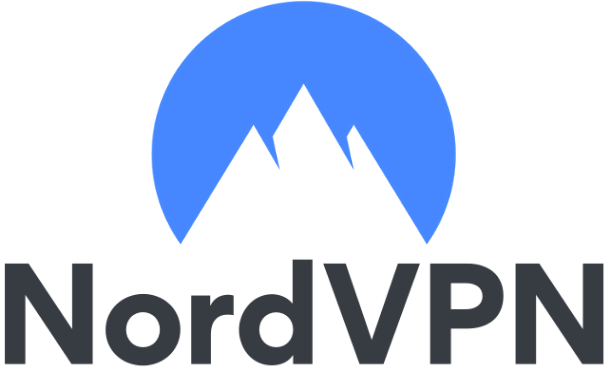
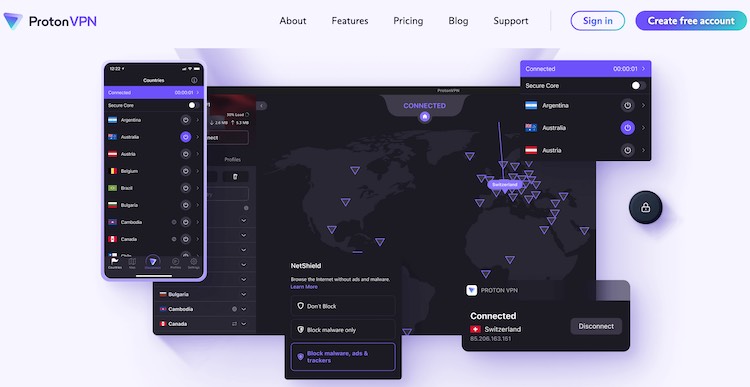
Proton as a brand has ZERO trust after repeated logging incidents.
Indeed, ProtonMail gave up user data in two cases that led to the arrest of the Proton user. We covered two of these cases:
ProtonMail Discloses User Data Leading to Arrest in Spain
ProtonMail Gives Up Logs on User, Then Scrubs Website of No IP Logging Claims
ProtonVPN and NordVPN are both excellent VPN services, each with its strengths. Assess your priorities, such as privacy, speed, or server locations, to determine which one better aligns with your needs. Both are reputable choices, so it ultimately comes down to your preferences.
Well…
Proton Vpn offers wireguard config files so you can use them in routers that support wireguard.
So, for example, you can route all your devices in your house .
Nord vpn can`t do that .
Also i have huge speeds with Proton, 300mbps .
I actually left Proton because the speeds were horrible. I don’t know about you, but I have fiber and Proton speeds were awful. I get way better performance with NordVPN than I ever did with Proton. I use west coast servers primarily (USA).
Under “Torrenting with NordVPN and Proton VPN” the writer of this article mentions in regard to Proton VPN:
The Free plan blocks torrenting traffic (you’ll need to upgrade your account)
Which is indeed true. But… You have to PAY for NordVPN to use it at all. It doesn’t even HAVE a FREE plan. So this argument of paying to torrent goes for BOTH VPN services. It seems rather biased to only mention it in regard to Proton VPN. If you’re going to use this negative argument, then use it for both services. This just isn’t fair. It makes me suspect that this article isn’t written by an objective person, which, sadly, isn’t uncommon on websites reviewing VPN services.
I personally don’t torrent, so I wouldn’t know about the download speeds. But for surfing, Spotifying, streaming and all of that, Proton VPN works perfectly fine on my side. I don’t have any problems with their mobile apps (Android) either. And I use it on both Windows and Linux. If you’re a Linux user… don’t use the Proton VPN Linux app… Just use the terminal… Sigh.
Having said this, I used NordVPN in the past, and had absolutely no problems with them either. Both are great VPN services in my view. You can’t really go wrong with either of ‘m. I might give NordVPN another go soon, to check whether they’re indeed faster than Proton. If they’re actually faster on a substantial level, I might get a subscription next to my Proton one.
Almost all of the trackers are literally from google, plus two of them are just for analytics.
Yes, NordVPN’s website, and most other VPN websites, run Google analytics, otherwise advertising with Google simply does not work (Google ads). It’s not perfect, but remember that the VPN website is separate from the VPN itself.
Given the fact I’ve never paid for Proton VPN nor Mail & use occasionally, I can’t knock them, especially their free Mail client.
However, I’m on my last year on my initial Nord VPN 3 year subscription & have been happy with the service. Only once did anything require fixing & this was the reinstall of a driver of a component of the service, Nord provided me with link & all. Fixed after reboot!
Now, I do hope that Nord VPN does hold their word & honor the 2nd 3 year contract at same price, as promised during the sale. If not, am going to be disappointed. May stay with Nord if they don’t hold their word, albeit with a sour taste in mouth. One’s word, be it from a person or company is just that, if they’ll screw me once, will again do the same. Have already looked & seen where my next bill would be payable for 2 years, but will reach out to Nord when they send me their next invoice in 2023 & it’s NOT the promised amount of re-subscribe time & price.
This is very useful and relevant information. :+1:
About the Proton logging, you meant Proton Mail? I’m sure it was Proton Mail and not their VPN. It’s not the same law for VPN vs email for Swiss.
Yes, there is now only one “Proton” with their new branding, but yes, it was the “Mail” side of things that has logged users.
When it comes to the location related to the service providers, I would like to know two more things in addition to the country where the company is registered.
1. The citizenship of the owners,
2. The country where the owners live.
The country of registration alone doesn’t tell much. If I live in a privacy unfriendly country or I am its citizen, that country can force me to make backdoors, give passwords or whatever.
The problem with ProtonVPN is their Kill Switch does Not work. Here’s what it does, with Kill switch on the vpn will drop out and say No Internet Connection then it will turn off the VPN and your Not protected. Then ProtonVPN will tell you you are turning off the vpn. It’s a joke. Tonight I tried to send a report bug but the send button was disabled. ProtonVPN has issues and Protonmail is insecure too. Been with these jokers too long. The NSA is probably their best customer. Not impressed.
My experience exactly…with the only notification a microscopic flashing of the icon in the task bar. I want a large “you are not protected” message to dominate the screen. And I have had poor exchanges with support…”do this, do that” eventually terminating in a shoulder shrug.
You need to use the VPN “always on” configuration. For more brick-wall settings, also set “Block connctions without VPN”. Problem solved.